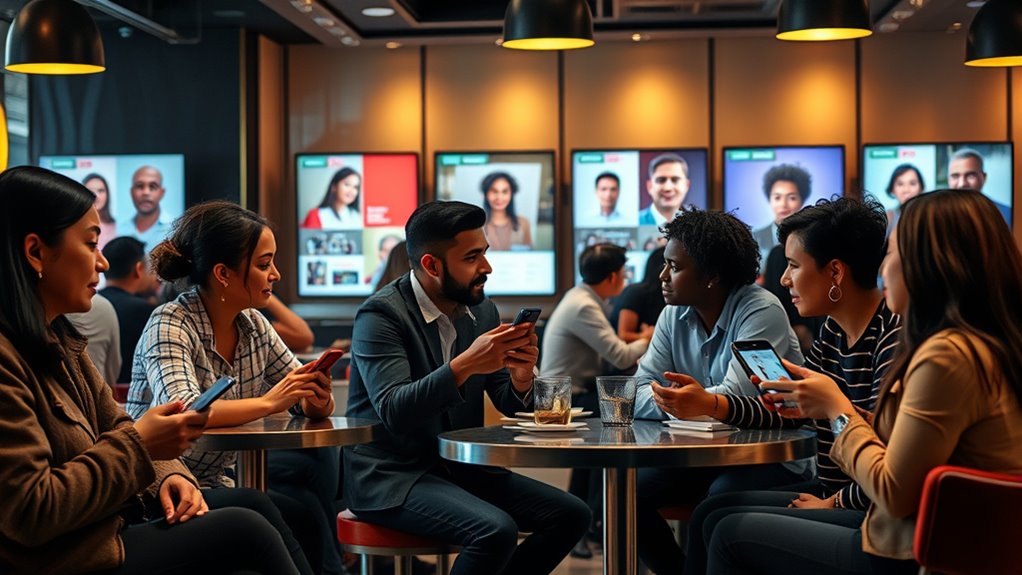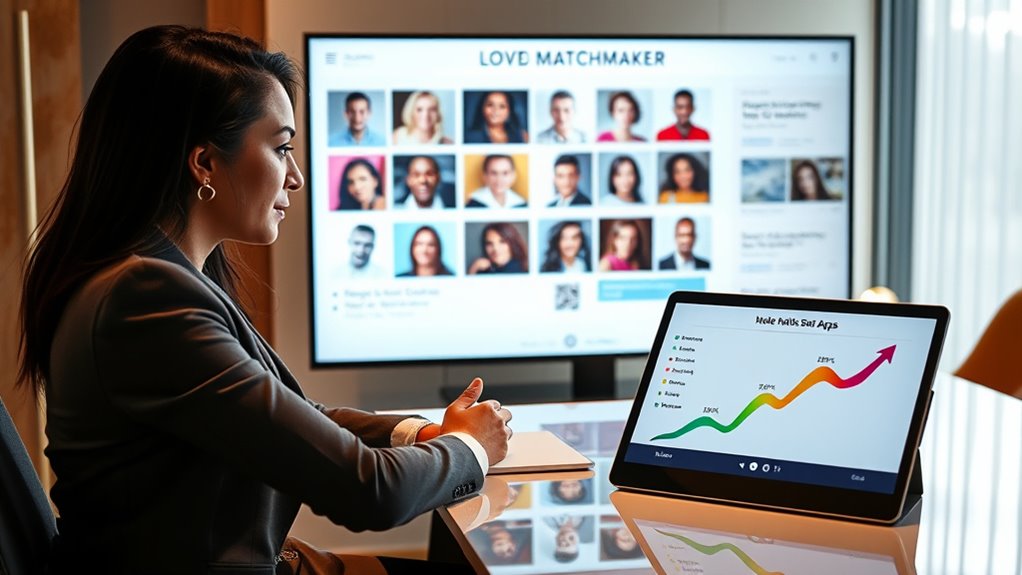Matchmaking services are evolving into highly personalized alternatives to swipe-based apps, often outperforming them in forming meaningful relationships. By using algorithms, psychological testing, and expert matchmaking, these services focus on quality over quantity, catering to specific lifestyles and needs. They prioritize privacy and genuine connection, especially in niche or elite markets. If you want to explore how these tailored approaches are reshaping modern dating, keep exploring what’s behind this shift.
Key Takeaways
- Personalized matchmaking offers higher success rates (80-90%) compared to swipe-based apps (10-30%).
- Traditional and elite services focus on deeper compatibility, emotional intelligence, and curated matches.
- AI-driven platforms analyze preferences for tailored connections, but may lack the emotional depth of personalized services.
- Niche and culturally tailored matchmaking cater to specific demographics seeking meaningful relationships.
- The future combines digital convenience with personalized, trustworthy, and exclusive matchmaking approaches.
The Rise of Digital Matchmaking in a Growing Market

The rise of digital matchmaking has transformed the way people find partners, fueled by rapid technological advancements and increasing smartphone penetration. Historically, matchmaking relied on traditional courtship, where families or community members played a central role in pairing potential partners. Today, online platforms and apps have shifted this process, making it more accessible and efficient. These platforms use algorithms, questionnaires, and data-driven insights to connect individuals based on shared interests, values, and preferences. This evolution has expanded the market considerably, with billions of dollars in revenue and millions of users worldwide. While traditional courtship emphasized personal interactions and community approval, digital matchmaking offers convenience, scalability, and personalized options, attracting a broad demographic and accelerating the overall growth of the industry. Additionally, the integration of high refresh rates and advanced matching algorithms has improved user engagement and success rates in finding compatible partners.
How Technology Is Transforming Partner Selection

Technology is revolutionizing how you find a partner by using AI-driven matching algorithms and personalized data analysis. These tools analyze your preferences, behaviors, and even psychological profiles to increase match accuracy. As a result, partner selection becomes more tailored, efficient, and likely to lead to meaningful connections. Incorporating insights from Beginners Guides can help users better understand how to optimize their profiles for these advanced systems.
AI-Driven Matching Algorithms
AI-driven matching algorithms are revolutionizing how partners are selected by analyzing vast amounts of user data to identify compatible matches more accurately. These algorithms assess preferences, behaviors, and psychological profiles to improve match quality. However, algorithm bias can influence outcomes, often reflecting existing societal stereotypes or skewed data, which may limit diversity or cultural compatibility. To combat this, platforms are refining algorithms to minimize bias and promote inclusivity. Cultural compatibility remains a key focus, as AI tools aim to connect individuals with shared values, traditions, and backgrounds. By continuously learning from user interactions, these algorithms become better at fostering meaningful connections, making matchmaking more efficient, personalized, and aligned with users’ cultural contexts. Additionally, ongoing efforts to address algorithm bias help ensure fairer and more diverse matchmaking outcomes.
Personalized Data Analysis
Personalized data analysis is transforming how partners are selected by enabling platforms to tailor matches more closely to individual preferences and behaviors. This approach considers key factors such as emotional intelligence, cultural compatibility, and lifestyle choices. With data-driven insights, you can expect: 1. Enhanced compatibility by analyzing emotional intelligence traits, ensuring smoother communication and deeper connections. 2. Better cultural fit by matching users based on shared backgrounds or similar values, reducing misunderstandings. 3. Increased success rates through algorithms that learn from your interactions, refining matches over time for more meaningful relationships. Understanding human emotions is also increasingly integrated into matching algorithms to foster genuine connections.
Demographic Shifts and New Opportunities in Matchmaking

As demographics shift, you’ll notice growing opportunities to serve diverse age groups, including the rapidly expanding older population seeking meaningful connections. Niche markets tailored to specific lifestyles, ethnicities, or preferences are becoming more prominent, offering personalized matchmaking experiences. Meanwhile, increasing digital adoption across all age groups creates new avenues to connect people more efficiently than ever before. Decluttering strategies can also be applied to create welcoming environments that foster genuine connections and reduce social barriers.
Aging Population Growth
Have you noticed the growing number of older adults seeking meaningful connections through matchmaking services? This demographic shift opens new opportunities, as seniors often prioritize companionship over casual dating. Here’s what you should know:
- Many older adults value interpersonal skills and emotional intelligence, making personalized matchmaking essential.
- Matchmakers need to uphold strong ethics, especially regarding privacy, safety, and honesty, as trust becomes paramount.
- The aging population’s increasing presence means services tailored to their unique needs—like health considerations and life experience—are in high demand.
- Recognizing common dream motifs related to aging and relationships can help matchmakers better understand clients’ subconscious desires and fears.
As a user or provider, understanding these shifts helps foster genuine relationships. Matchmaking for seniors emphasizes ethical practices and interpersonal mastery, creating spaces where meaningful connections can flourish beyond superficial matches.
Niche Demographic Focus
The rise of niche demographics in matchmaking reflects a strategic shift toward serving specific groups with tailored services, creating new opportunities for both providers and users. Historically, matchmaking focused on broad audiences, but today’s emphasis on niche markets aligns with evolving demographics and preferences. This shift prompts a reevaluation of matchmaking ethics, emphasizing transparency, privacy, and cultural sensitivity. By specializing in ethnicity, sexual orientation, age, or lifestyle, services can better meet unique needs and foster meaningful connections. This targeted approach also raises questions about fairness and inclusivity, but ultimately enhances success rates. As providers adapt to demographic shifts, they must balance personalized offerings with ethical standards, ensuring that tailored services respect diversity while maintaining integrity. Incorporating Relationships – Personality Test insights can further improve compatibility assessments and client satisfaction.
Digital Adoption Trends
Digital adoption is reshaping how matchmaking services reach and serve diverse demographics, creating new opportunities for growth and innovation. You’ll see this reflected in three key trends:
- Historical dating methods now blend with digital tools, making it easier for older generations to find matches online.
- Celebrity endorsements boost credibility, attracting wider audiences and fostering trust in niche and elite services.
- Platforms leverage data and AI to personalize experiences, increasing success rates and appealing to evolving demographic needs.
As a result, matchmaking companies are expanding beyond traditional boundaries, embracing digital channels to target an increasingly diverse client base. This shift opens doors to new markets and enhances service quality, especially for those seeking privacy, safety, or specialized matchmaking—further fueling the industry’s growth.
Success Rates: Are Personalized Services Outperforming Apps?

Are personalized matchmaking services truly more effective than traditional apps? Many believe they are, thanks to methods like compatibility testing and tailored approaches. Traditional matchmaking focuses on in-depth assessments and curated matches, often resulting in higher success rates. Reputable services report success rates between 80% and 90%, markedly outperforming generic apps, which typically range from 10% to 30%. Personalized services leverage psychological testing, detailed interviews, and ongoing coaching to understand client needs deeply. This focus on quality over quantity helps create meaningful connections, increasing the likelihood of long-term relationships. Additionally, emotional intelligence plays a significant role in fostering genuine understanding and connection. While apps can facilitate quick matches, they lack the nuanced understanding that personalized services provide, making them more effective for those seeking serious, lasting partnerships.
Regional Trends and Cultural Influences Shaping the Industry

Regional trends and cultural influences markedly shape the growth and nature of the matchmaking industry worldwide. Your region’s cultural influence determines how matchmaking services operate and what clients prioritize. For example:
- In some cultures, offline matchmaking remains dominant due to strong family involvement and traditional values.
- Regional preferences for privacy and exclusivity fuel elite matchmaking’s popularity in certain areas.
- Societal attitudes toward dating apps vary, with some regions embracing digital platforms quickly, while others favor personalized, community-based services.
- Incorporating market analysis helps matchmakers understand regional preferences and tailor their offerings effectively.
These differences influence service offerings, marketing strategies, and success metrics. Understanding regional preferences helps matchmakers adapt to local customs and expectations, ensuring their services resonate with diverse client bases and thrive across cultural landscapes.
Elite and Niche Matchmaking: Catering to Specific Lifestyles

Elite and niche matchmaking services have gained prominence by offering highly personalized and exclusive experiences tailored to specific lifestyles and preferences. You’re drawn to luxury branding that emphasizes sophistication, privacy, and high-end service. These firms focus on ethical matchmaking, ensuring genuine connections rather than volume-based matches. They cater to clients with distinct needs—whether they’re busy professionals, members of specific cultural communities, or individuals seeking shared values and backgrounds. By integrating personalized relationship coaching and in-depth psychological assessments, these services deliver a refined approach that aligns with your unique goals. Unlike traditional dating platforms, elite and niche services prioritize quality over quantity, fostering meaningful connections built on trust, shared ideals, and a tailored experience that respects your lifestyle. Incorporating elements that promote trust and transparency can further enhance the quality of matches and client satisfaction.
Safety and Privacy: Addressing Concerns in Modern Dating

As online dating continues to grow in popularity, safety and privacy have become critical concerns for users seeking genuine connections. You need to protect your personal information, verify identities, and avoid scams. Historically, matchmaking relied on trusted intermediaries and personal connections, but now, celebrity partnerships often prioritize confidentiality and discretion. Here’s how to stay safe today:
- Use platforms with robust privacy policies and encryption.
- Verify matches through video calls before sharing sensitive info.
- Be cautious of red flags like inconsistent stories or requests for money.
Elite matchmaking services emphasize confidentiality, addressing safety concerns more effectively than casual apps. With increasing awareness, your best bet is choosing services that prioritize privacy—so you can focus on finding a real connection without worry.
Financial Insights: The Economics Behind Matchmaking Services

Have you ever wondered what drives the booming economy of matchmaking services? It all comes down to smart pricing strategies and customer retention. Successful platforms often use tiered pricing, offering basic memberships alongside premium packages with personalized services. Elite matchmaking firms focus on high-value clients, charging substantial fees for tailored matchmaking and coaching, which boosts revenue per user. Customer retention plays a vital role—platforms invest in quality service, personalized attention, and ongoing engagement to keep clients satisfied and loyal. This approach guarantees steady income streams and encourages repeat business. As the market grows, balancing competitive pricing with high-quality, personalized experiences remains essential. Ultimately, these financial strategies help matchmaking services thrive, making them a lucrative industry with strong growth potential.
Future Outlook: Will Traditional Methods Make a Comeback?

Despite the rapid rise of online and AI-driven matchmaking platforms, traditional methods like offline matchmaking and personal introductions may still find their place in the future. You might wonder why, given the convenience and data-driven success, historical matchmaking and traditional courtship still matter. Here’s why:
- They foster deeper emotional connections beyond algorithms.
- They preserve cultural and personal values often lost in digital exchanges.
- They cater to those seeking privacy, exclusivity, or personalized guidance.
While technology accelerates the process, many still believe that genuine chemistry and shared history can’t be fully replicated online. Traditional matchmaking offers authenticity and depth that some prefer, ensuring that these methods continue to coexist with modern platforms.
Frequently Asked Questions
How Do Matchmaking Success Rates Compare Between Online Platforms and Offline Services?
You’ll find that offline matchmaking services often boast higher success rates, around 80-90%, thanks to personalized strategies and dedicated relationship coaching. Online platforms typically have success rates between 60-85%, but their automated matching and data-driven personalization can improve outcomes. Pricing models influence success too; premium services with tailored approaches tend to deliver better results, emphasizing quality over volume. Ultimately, personalized strategies and investment in quality services drive higher matchmaking success rates.
What Are the Main Factors Driving Growth in Niche and Elite Matchmaking Markets?
You’ll find that luxury branding and personalized coaching are key drivers behind the growth of niche and elite matchmaking markets. These services appeal to clients seeking exclusivity, privacy, and tailored experiences. By emphasizing high-end branding and offering personalized coaching, providers differentiate themselves from traditional platforms, attracting affluent clients who value bespoke approaches to finding meaningful relationships. This focus on quality and customization fuels the expanding demand for elite matchmaking services.
How Is AI Improving Match Accuracy and User Experience?
AI algorithms improve match accuracy by analyzing vast amounts of data, including psychological tests and user preferences. You benefit from enhanced user personalization, as these algorithms tailor suggestions based on your unique traits and behaviors. This makes the process more efficient and meaningful, increasing your chances of finding a compatible partner. With AI, matchmaking platforms become smarter, creating a smoother experience that adapts over time to better meet your relationship goals.
What Safety Measures Do High-End Matchmaking Services Prioritize?
High-end matchmaking services prioritize safety through strict privacy policies and thorough background checks, ensuring clients feel secure. Did you know that elite services often have success rates above 80%? They carefully vet clients to prevent fraud and scams, and maintain confidentiality with advanced data security measures. These safeguards give you peace of mind, knowing your personal information stays private and that you’re connecting with genuinely vetted, trustworthy individuals.
How Do Regional Cultural Differences Influence Matchmaking Service Offerings?
Regional cultural differences profoundly shape matchmaking service offerings by emphasizing cultural nuances and regional preferences. You’ll find services tailored to local customs, traditions, and values, whether that’s focusing on family approval in Asia or emphasizing individual compatibility in Western societies. These services adapt their approach, communication styles, and matchmaking criteria to resonate with cultural expectations, ensuring clients feel understood and respected within their unique social contexts.
Conclusion
As the digital landscape continues to evolve, matchmaking services are transforming into vibrant marketplaces of connection, like bustling city streets alive with possibility. You’re at the crossroads of tradition and innovation, where tech acts as a guiding compass through the romantic wilderness. Whether you’re swiping or seeking personalized guidance, remember that behind every profile lies a story waiting to unfold. The future of love is a canvas—ready for you to paint your own masterpiece.










